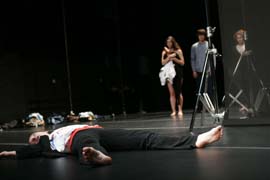
Jack Anderson
Trajal Harrell at the End of Time
Trajal Harrell: "Quartet for the End of Time"
Dance Theater Workshop
219 West 19th Street, Chelsea
October 15-18 at 7:30 p.m., $26, $15 students and seniors
Tickets: (212) 924-0077 or www.dancetheaterworkshop.org
Reviewed by Jack Anderson, October 18, 1008
Much thought presumably went into Trajal Harrell's elaborate "Quartet for the End of Time." Much technological gimmickry certainly did. Nevertheless, Harrell and Julie Perrin, his dramaturg, came up with a numbingly monotonous production.
It opened with a jumble of projected images, many indistinct, yet some clearly views of building interiors and exteriors, forests, a cemetery, a red bloodlike liquid, and a swan, all flashing by to an equally jumbled taped collage layered with solemn sounds, as well as voices talking about something coming to an end and singing praises of girls in g-strings.
 |
"Trajal Harrell" byTrajal Harrell at Dance Theater Workshop October 14, 2008 , Dancers :Christina Vasileiou; Sirah Foighel; Will Gordon; Liz Santorol Photo by Alexandra Corazza. |
Meanwhile, one heard little taped stories: one about a sound trying not to make a sound; another about a strange door in a floor. One also occasionally heard bits of Messiaen, the French composer who provided Harrell with his title.
Messiaen wrote his "Quartet for the End of Time" (for clarinet, violin, cello, and piano) in a Nazi prison camp. With its ethereally serene melodies and some of the avian chirpings one has come to expect of Messiaen, a bird-loving composer, this piece remains a remarkable example of musical mysticism. If only Harrell had been choreographically willing to trust it. But he combined Messiaen with samples from nine other musical sources, with sonically indigestible results.
 |
"Trajal
Harrell"byTrajal Harrell Dancer:Sirah Foighel. Photo by Alexandra
Corazza. |
Here I must confess I was disappointed that Harrell did not give us the production his own advance statements about it seemed to describe. Reading them, it was possible to assume that he intended a creation juxtaposing Messiaen with movements derived from minimalism, fashion spectacles, and "hootchy-kootchy" dancing. He said he thereby tried to ask "if it is possible to present sincerity in our current culture of increasing irony." (My own possibly naïve answer to that question is, "Of course: just be personally sincere about whatever you put on stage, and let spectators make of it what they will.")
Critical theorists have long insisted (and rightly) that to judge art works on the basis of what the artists say their intentions are is unfair: artists may not be able to verbalize their intentions well; or their actual creations may in some way transcend their stated intentions or make those intentions appear irrelevant. We did get a bit of fashion parading, the wiggling might be called hootchy-kootchy, and the choreographic invention was undeniably minimal, often intolerably so. But, as I interpreted them, Harrell's stated intentions promised something more, or at least something other, than what he delivered.
Curiously, no matter what happened on stage, however banal it may have been, the action looked most compelling when the accompaniment was unadorned Messiaen. At those times, and they were few, the composer's uncanny intensity and wholehearted, even heartbreaking, sincerity (yes, sincerity) made one watch and listen with unwavering concentration. But nothing finally prevented Harrell's 90-minute "Quartet for the End of Time" from seeming endless.
| museums | NYTW mail | recordings | coupons | publications | classified |
